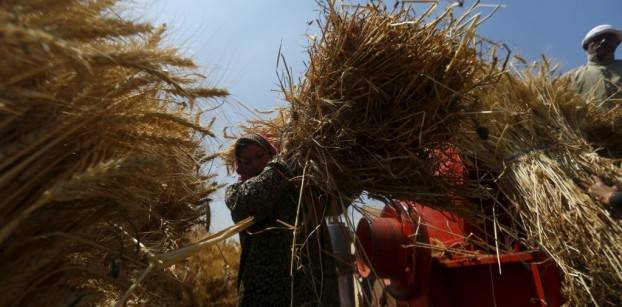Latest NEWS
- Aswat Masriya, the last word
- Roundup of Egypt's press headlines on March 15, 2017
- Roundup of Egypt's press headlines on March 14, 2017
- Former Egyptian President Hosni Mubarak to be released: lawyer
- Roundup of Egypt's press headlines on March 13, 2017
- Egypt's capital set to grow by half a million in 2017
- Egypt's wheat reserves to double with start of harvest -supply min
- Roundup of Egypt's press headlines on March 12, 2017
Egypt's supply ministry rejects wheat fraud allegations
CAIRO (Reuters) - Egypt's Ministry of Supplies on Sunday dismissed allegations that its wheat procurement figures were inflated and promised penalties for domestic suppliers that misreport stocks.
The ministry announced a government-led inspection of wheat silos this month after an unusually high procurement figure prompted widespread fraud allegations from top industry officials, traders and parliamentarians.
The world's biggest importer of the grain said it had ended its local procurement this month with nearly 5 million tonnes of wheat from its farmers, markedly higher than the 3 million to 3.5 million tonnes a year delivered over the past decade.
If the numbers were misrepresented, Egypt may have to buy more foreign wheat to meet domestic demand while contending with a dollar shortage that has already sapped the country's import capability.
Wheat industry officials and parliamentarians have appeared on television and in local newspapers in recent days saying that private suppliers have misreported stocks to boost government payments on highly subsidised local wheat.
The ministry, however, denies that any wheat is missing from silos around the country.
"We do not believe the state has lost money or that funds have been wasted," the ministry said, adding that suppliers would be fined if found to be misreporting their stocks.
"There is a 25 percent penalty on quantities not supplied in addition to the price of the wheat itself."
A lawyer representing a group of wheat industry officials who are demanding an independent inspection of silos challenged the ministry's claims.
"Why doesn't the ministry want a neutral committee formed to count some of these storage areas to clarify the truth of the matter?" the lawyer, Mohamed Heikal, said in a statement to Reuters.
But the ministry said on Sunday that -- independently assessed or otherwise -- it is not possible to verify quantities held in each storage site until the wheat is fully discharged.
"There is no one able to estimate the quantity of wheat in a silo except by actually discharging the wheat inside of it, and that has not happened yet," the ministry said.
The ministry typically issues payment for wheat during the collection period and before it is discharged and delivered to government mills.
Millers and traders told Reuters that tools do exist to count wheat in storage and that discharging the wheat before counting it will allow suppliers to mix cheaper imported grains into their stocks to cover gaps.
(Reporting by Eric Knecht and Maha El Dahan; Editing by David Goodman)












